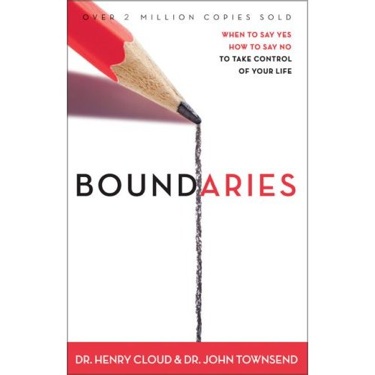
One of the classic books on how to establish better personal boundaries is “Boundaries: When to Say Yes, When to Say No, To Take Control of Your Life” by Henry Cloud and John Townsend. This summer I brought it to the pool with me the week before our family vacations–just to help me get into better shape … you know, given the complications of family situations–and it provoked all kinds of interesting discussions about family neuroses among my friends and other pool members. Apparently boundary problems are quite common … which is why Cloud and Townsend have sold more than 2 million copies of their book.
Especially intriguing was chapter five, on the ten laws of boundaries. For the purpose of length, I highlight seven of them below, excerpting text from that chapter.
Happy boundaries making to you!
Law 1: The Law of Sowing and Reaping
The law of cause and effect is a basic law of life. Sometimes, however, people don’t reap what they sow, because someone else steps in and reaps the consequences for them. Establishing boundaries helps codependent people stop interruption the Law of Sowing and Reaping in their loved one’s life. Boundaries force the person who is doing the sowing to also do the reaping.
Law 2: The Law of Responsibility
Problems arise when boundaries of responsibility are confused. We are LOVE one another, not BE one another. I can’t feel your feelings for you. I can’t think for you. I can’t behave for you. I can’t work through the disappointment that limits bring for you. In short, I can’t grow for you; only you can. Likewise, you can’t grow for me.
Law 3: The Law of Respect
If we love and respect people who tell us no, they will love and respect our no. Freedom begets freedom. Our real concern with others should not be “Are they doing what I would do or what I want them to do?” but “Are they really making a free choice?” When we accept others’ freedom, we don’t get angry, feel guilty, or withdraw our love when they set boundaries with us. When we accept others’ freedom we feel better about our own.
Law 4: The Law of Motivation
These false motives and others keep us from setting boundaries: fear of loss of love or abandonment, fear of others’ anger, fear of loneliness, fear of losing the “good me” inside, guilt, payback, approval, over-identification with the other’s loss. The Law of Motivation says this: Freedom first, service second. If you serve to get free of your fear, you are doomed to failure.
Law 5: The Law of Evaluation
We cause pain by making choices that others do not like, but we also cause pain by confronting people when they are wrong. But if we do not share our anger with another, bitterness and hatred can set in. We need to evaluate the pain our confrontation causes other people. We need to see how this hurt is helpful to others and sometimes the best thing that we can do for them and for the relationship.
Law 6: The Law of Envy
Envy is a self-perpetuating cycle. Boundaryless people feel empty and unfulfilled. They look at another’s sense of fullness and feel envious. This time and energy needs to be spent on taking responsibility for their lack and doing something about it. Taking action is the only way out.
Law 7: The Law of Activity
Many times we have boundary problems because we lack initiative–the God-given ability to propel ourselves into life. Our boundaries can only be created by our being active and aggressive, by our knocking, seeking, and asking.
* Click here to subscribe to Beyond Blue! And click here to follow Therese on Twitter. And click here to join Group Beyond Blue, a depression support group. Now stop clicking.

